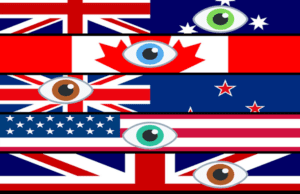In the aftermath of Edward Snowden’s revelations about the National Security Agency (NSA), citizens in the US learned about surveillance in the country. However, there is more to that than you may realize. Sometimes, you’ll see terms like 5 eyes, 9 eyes, or 14 eyes. Those terms are references to multi-lateral intelligence agreements between many of the English-speaking countries and allies. While that may seem complicated, we plan to explain it more thoroughly.
During World War 2, the English-speaking countries formed a secret multi-lateral agreement called the Five Eyes. That allowed the US, UK, Canada, Australia, and New Zealand to share intelligence information. The original intent was to protect the citizens from external threats. As security threats grew, the alliance added four more countries. Those were the countries of Denmark, France, Netherlands, and Norway. The organizations referred to this formal agreement as the Nine Eyes agreement.
| Rank | VPN Service | Rating | Visit | Server Locations | No Logs | Browser Extensions | Smart DNS |
|---|---|---|---|---|---|---|---|
| 1 |  | 9.8 |  | 160 |  |  |  |
| 2 |  | 9.4 |  | 87 |  |  |  |
| 3 |  | 8.8 |  | 70 |  |
While the Fourteen Eyes Agreement is less formal than the Nine Eyes version, the alliance countries can still exchange data with the US’s monitoring agency, the NSA (National Security Agency). Those additional countries include Germany, Belgium, Italy, Sweden, and Spain. Keep in mind that there are several additional counties. While not “officially” part of the alliance, there are several suspect countries. Those include Israel, Japan, Singapore, and South Korea. All four of them are “friendly” with the NSA.
Unfortunately, these agreements have changed from their original intent. These days, the post World War 2 agreements are all about cybersecurity.
Let’s sum up the countries in the agreements.
- 5 Eyes – The original alliance included the US, UK, Canada, Australia, and New Zealand.
- 9 Eyes – The Five Eyes plus Denmark, France, Holland, and Norway.
- 14 Eyes – Nine Eyes plus Germany, Belgium, Italy, Sweden, and Spain.
- Suspect Countries – Israel, Japan, Singapore, and South Korea
What that Means for VPN Users
If your VPN provider falls under one of those countries’ jurisdictions, your data may be shared with any one of those 14 countries. Depending on the server’s physical location, the company may have to cooperate with authorities to turn your information over. That means you need to pay attention to where your provider is located. Here are some questions you should consider when choosing a provider.
- What is the company’s business address? – Obviously, if your provider is in one of the agreement countries, you could be in danger.
- Is VPN legal in your country? – Sadly, some countries either ban VPNs or are thinking about it.
- Is the server you are connecting to an actual location or a virtual one? – This matters because if the server is in an actual location, it falls under the rules of that country.
- If it is a virtual one, where is the server actually located? – This question may be tricky to answer. However, any good provider should be able to answer this question through customer service contact.
Why No Logs Policies are Important
These days, many companies offer a “no-logs” policy. That means they do not have an activity log for users or the websites where the user has been. If the police need to get involved, you’ll want to know that your information is safe. Sadly, that may not be enough for companies based in one of the 14 Eyes countries. While there is no proof that it makes a difference, we suggest caution in that case.
Now, we’ll take a look at the base of operations for our 3 providers.
ExpressVPN – British Virgin Islands (sometimes abbreviated BVI). Despite the name, this tiny country is located in the Caribbean Sea. It has its own legislature, an independent judiciary, and a national police force. It is not part of any information-sharing alliance and residents enjoy free and unrestricted access to the internet.
NordVPN – Panama. As with BVI above, Panama falls outside the jurisdiction of any information-sharing agreements. In fact, the constitution specifically protects all forms of expression.
VyprVPN – Switzerland. Long known for its privacy in other matters, this European country has some of the best internet protections in all of Europe. Because of that, you won’t have to worry about your data being protected with them. The country enjoys a constitutional right to free speech.
And that is the explanation of the Five, Nine, and Fourteen Eyes alliances. There are big differences between alliance-based and no alliance countries. We suggest choosing a VPN provider that will help protect you the best. Please share it with your friends so they can protect themselves with a VPN along with you. Follow us @VPNFan for the latest deals and guides.

